4 minutes
Pension performance update: July 2023
- By
- Murray Humphrey
See how Penfold's funds and the global markets performed in July.

As most people’s attention turned to the summer holidays and the possibility of winding down and taking a break, the stock market had other ideas.
Global equities continued their march upwards in July, with the UK having a particularly stellar month as an air of optimism returned to the British market, which made strong gains.
Remember, you have a very long time horizon with pension savings. They are invested to generate growth in your savings over the long term, but that growth is only possible by having short term ups and downs along the way.
This article should help you understand some of the key reasons why those ups and downs happen. Keep in mind that markets have historically always recovered to grow steadily over the long term.
How our pension plans performed
As temperatures sizzled, so did all of our pension plans, which made gains across the board in July.
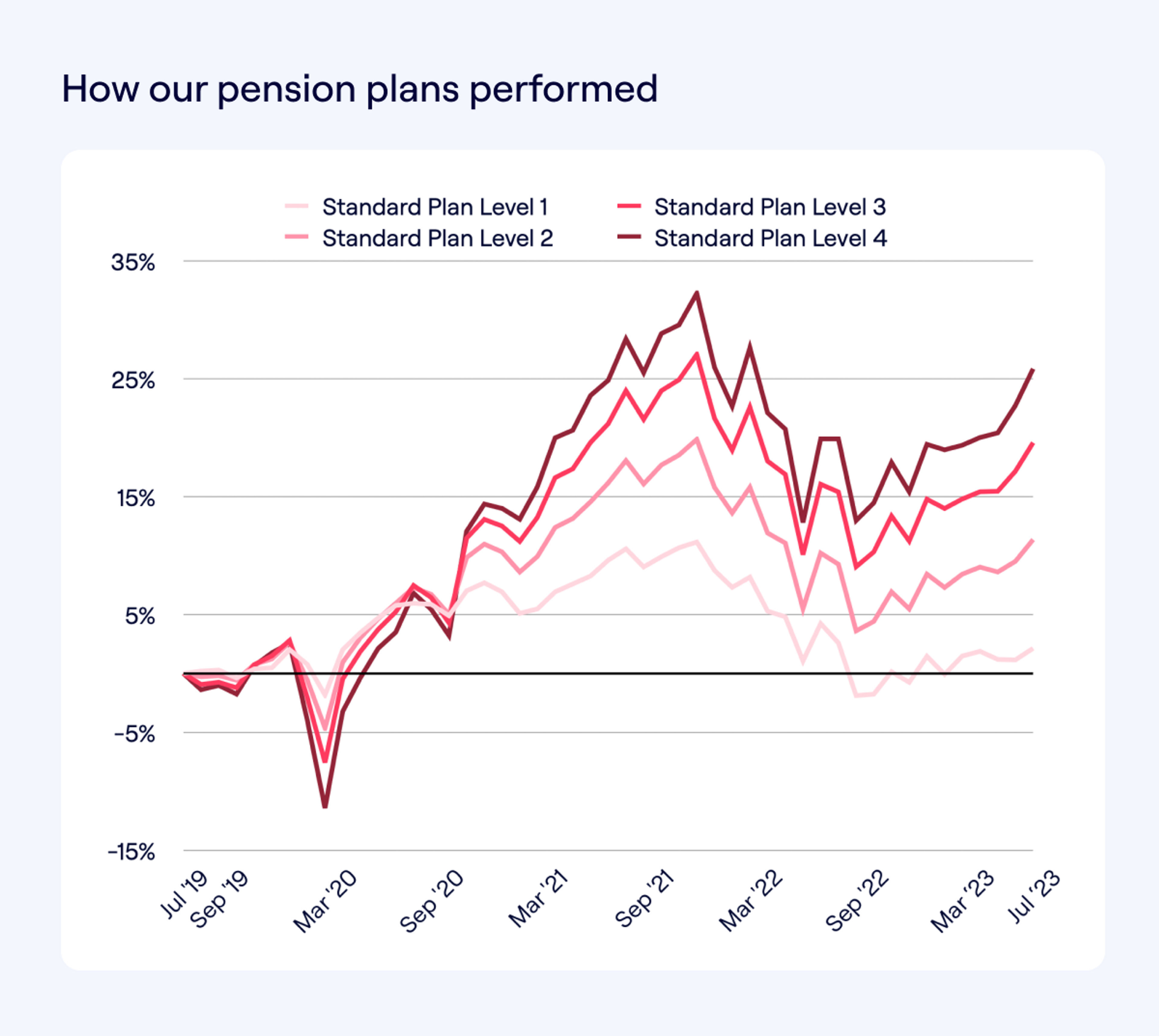
Global equities finished the month higher and our pension plans joined the party, with the outstanding performers being our Sharia and Sustainable plans, which both notched up very healthy percentage point increases.
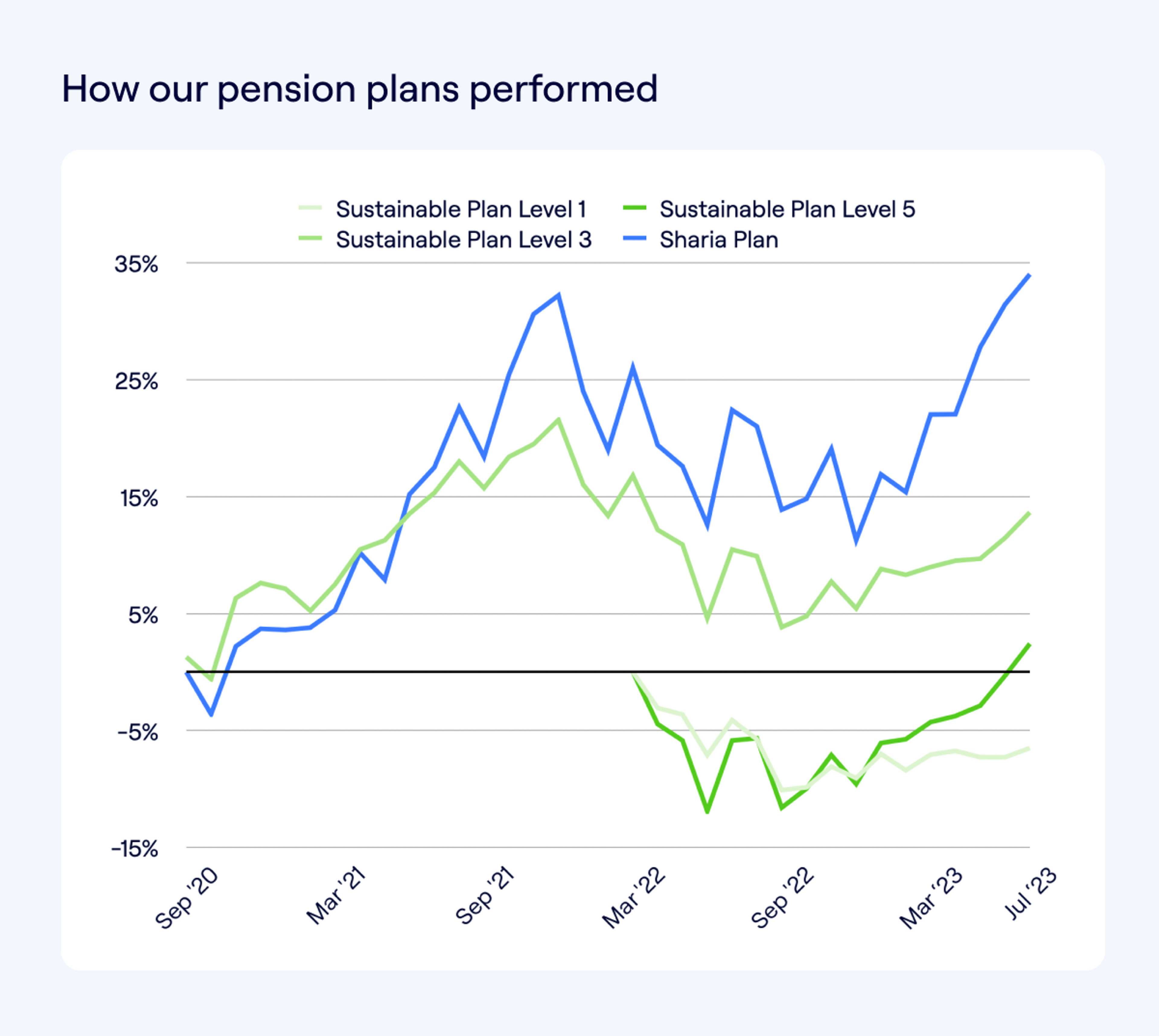
What makes this possible? There's no hidden secret. Penfold's funds are built on strategically diversified portfolios designed to decrease risk exposure, limit potential losses, and improve overall investment performance.
This approach is particularly valuable during challenging market conditions, as a well-diversified portfolio is more likely to withstand market fluctuations and deliver more stable returns over time.
The rise and rise of the US
The US market rose again in July. But after a remarkable 6% rise in June for the S&P 500, which tracks the performance of the biggest 500 companies in the US, the increase was unsurprisingly lower this month.
That said, the 3.1% jump for the S&P 500 was bigger than that of the UK market and marked the longest streak of monthly gains since August 2021, defying concerns about rising interest rates globally and spikes in the cost of living.
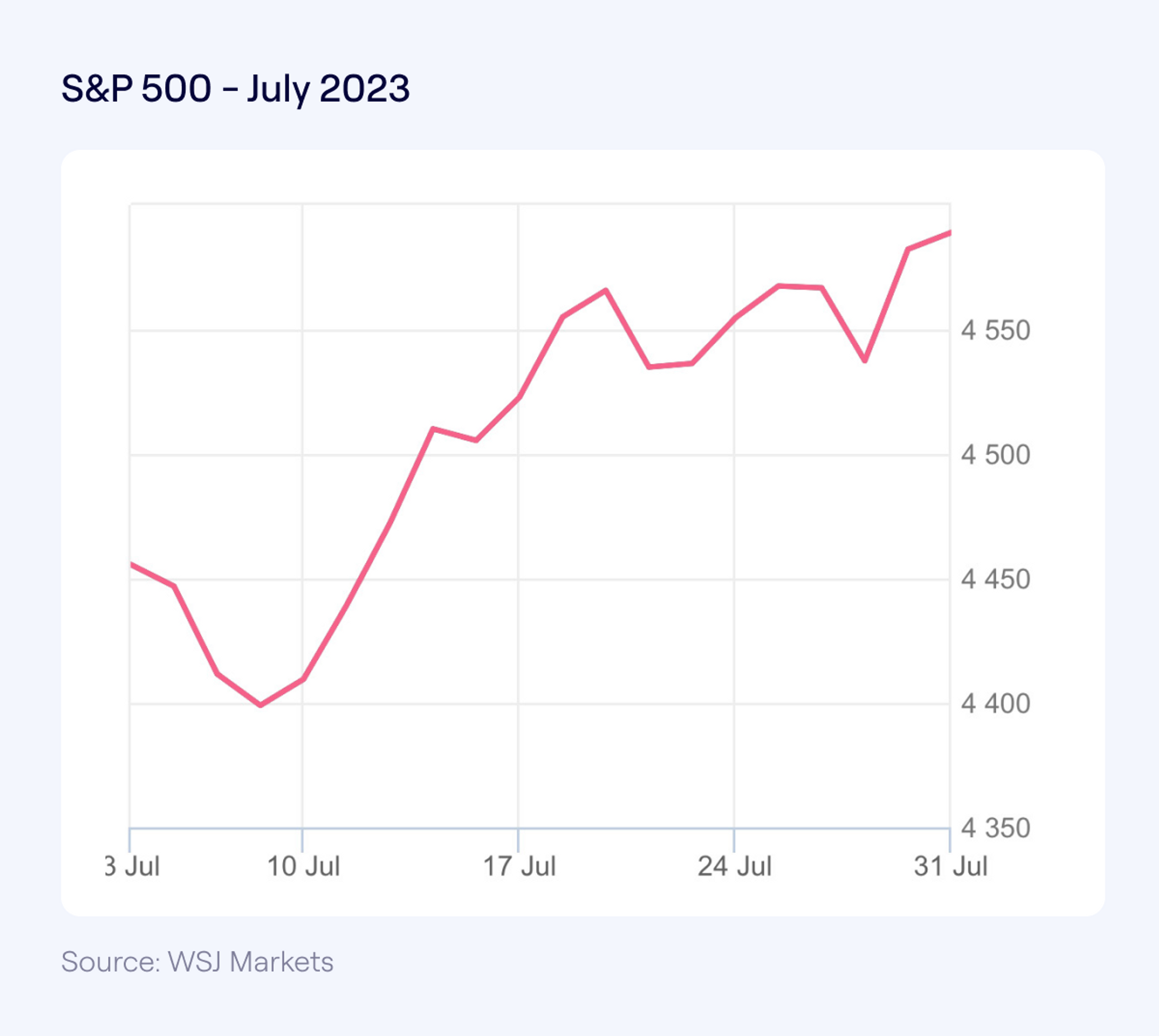
The 3.1% increase was the fifth consecutive month of gains in the US and for avid readers of our monthly performance commentaries it will be no surprise what one of the main contributors has been. Yep, that’s right: technology stocks.
The major names in this sector, the likes of Apple, Facebook owner Meta, and Alphabet, the parent company of Google, have done much of the heavy lifting for the S&P 500 this year as investors look to buy into companies best positioned to ride the growing wave of interest in artificial intelligence. And July was no exception.
One lesser known name, however, has outshone all others, with the share price of Californian chipmaker Nvidia more than doubling since the start of 2023. The multinational company is one of the most dominant suppliers of artificial intelligence hardware and software and, unsurprisingly, saw its share price climb again in July, alongside that of the more famous players of Apple, Meta and Alphabet.
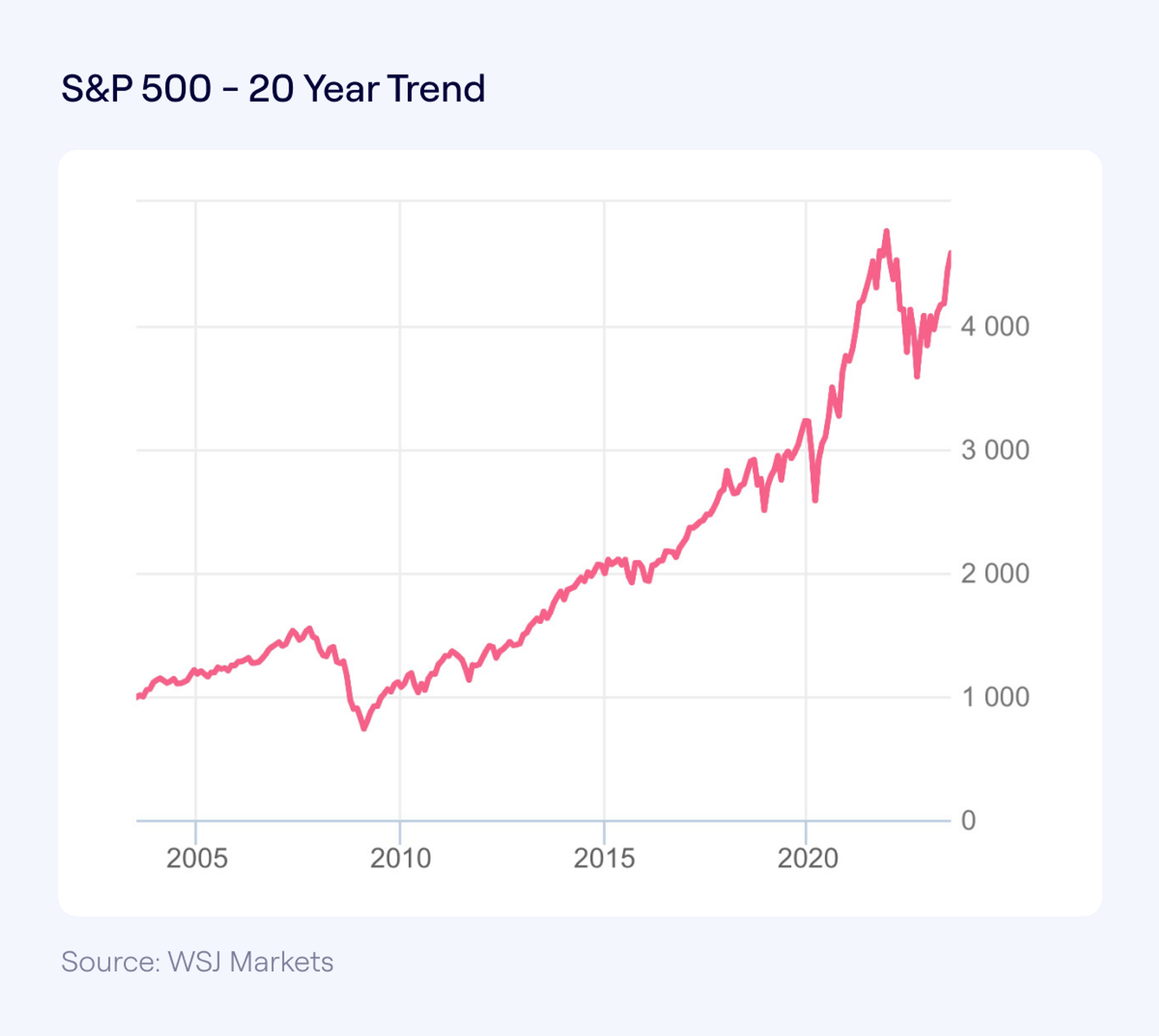
As a reminder, while it's helpful to stay informed with the latest news, the S&P 500's upward trend over the past decade demonstrates that, despite short-term market fluctuations influenced by financial events, it's the long-term growth trajectory that is crucial for accumulating pension wealth.
UK stocks strike back
The UK stock market bounced back in July after a sluggish June that basically saw the FTSE 100, which tracks the performance of the biggest 100 companies in the UK, finish the month flat.
In July, however, the FTSE 100 ended the month more than 2% higher as concerns over rising prices and sharp increases in the cost of living eased slightly.
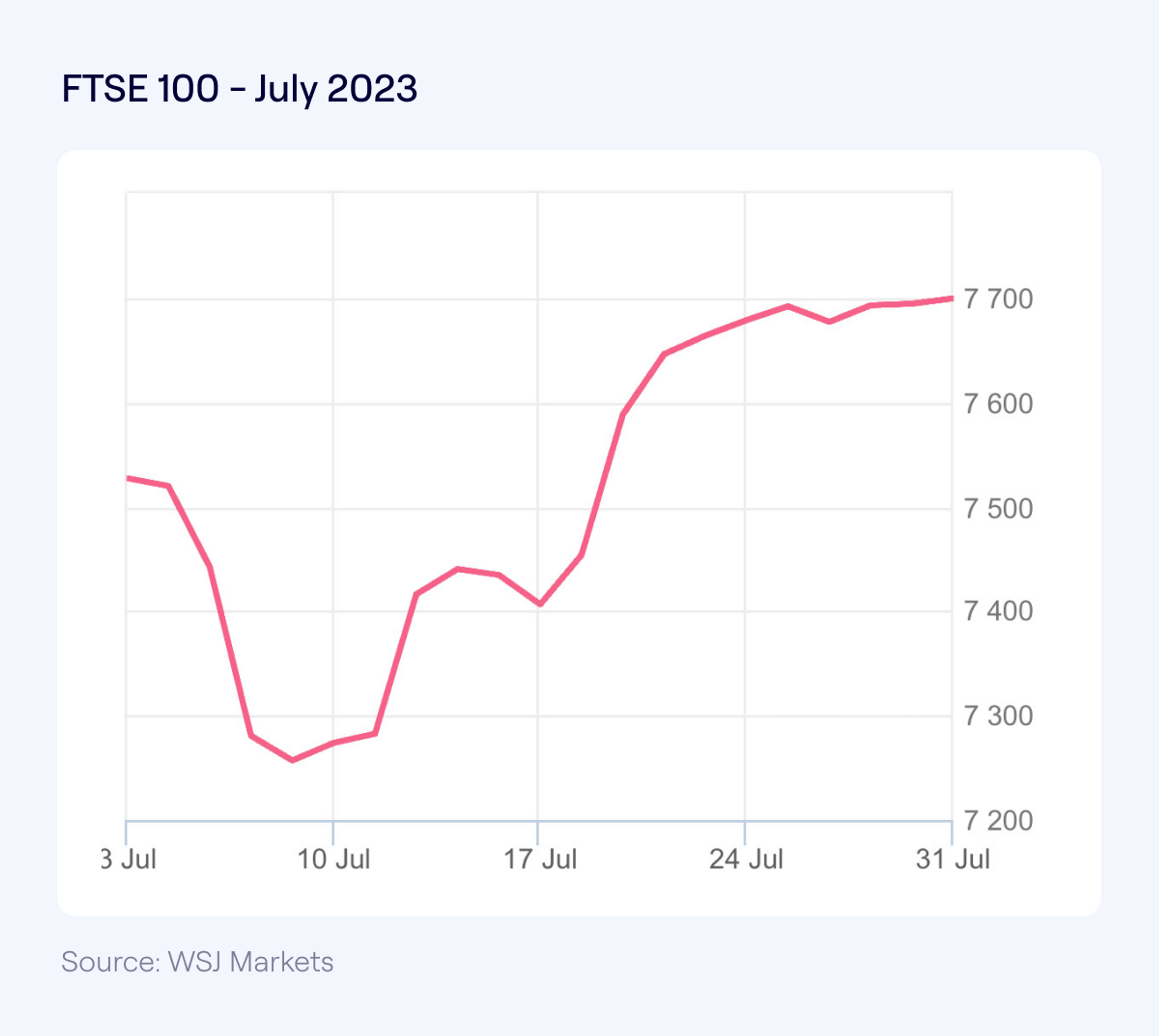
Positive news came on July 19 when the Office for National Statistics published data that showed inflation had dropped to 7.9%, a bigger than expected decrease, after petrol and diesel prices fell by almost a quarter on a year earlier.
This fall buoyed investors who became more optimistic that the Bank of England might now be in a position to try and bring to an end to its hectic cycle of interest rate rises, which were brought in to try and slow inflation.
In June, the UK central bank surprised investors by increasing rates by half a percentage point to 5% – the highest it’s been since 2008 - but there was no rise in July, which gave markets some breathing space.
We mentioned some of the country’s biggest house builders last month whose stock had been suffering because of rising interest rates.
But because of the expectation that rates are now near their peak as well as the fact the Bank of England’s monetary policy committee did not meet in July as scheduled (and so rates could not rise if even the committee wanted them to) the share prices of Taylor Wimpey, Persimmon and Bellway actually rose in July after previously falling by more than a third this year.
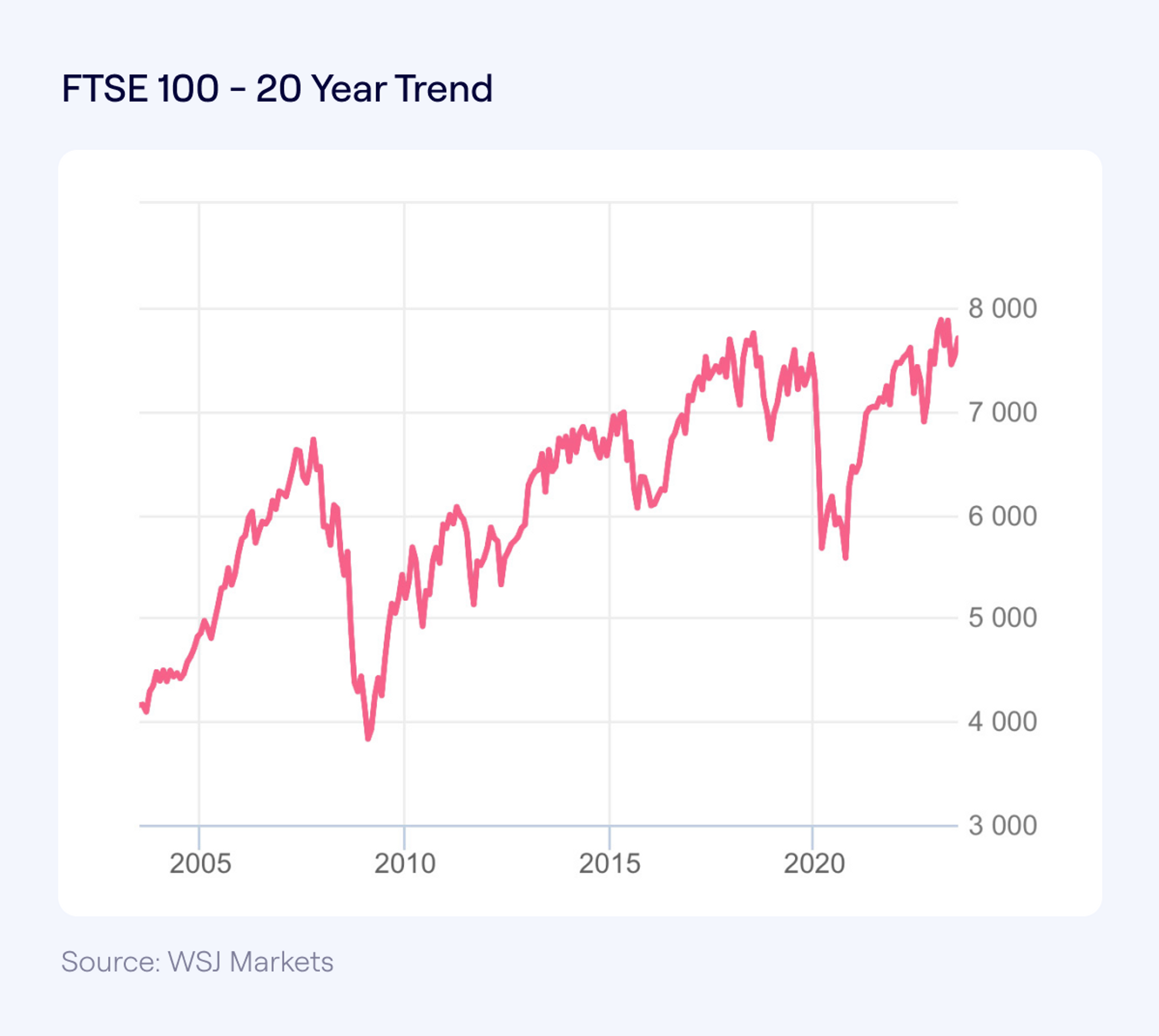
As the 10 year performance graph of the FTSE 100 above shows, it's the long-term trajectory that truly matters when it comes to building your pension pot. Short-term market changes may occur, but it's the consistent growth over time that contributes significantly to your pension.
Inflation slows in the EU
After a fall in May, Eurozone stocks had their second consecutive month of positive returns in July, with investors growing more confident that the European Central Bank is now close to the end of its cycle of interest rate hikes.
The pan-European Stoxx 600 index, which tracks the performance of 600 companies across Europe, returned almost 2% in July, almost on a par with the UK.
The European Central Bank increased interest rates for the ninth consecutive time in July, but policymakers raised the possibility of a pause in September after inflation fell during the month.
Eurostat, the EU’s statistical office, said inflation had slowed to 5.3 per cent in July. It’s now at its lowest since January last year but unfortunately remains well above the European Central Bank’s 2% target.
But the drop off has meant investors remain hopeful of an end to future interest rate rises and better times to come as, in general, interest rate rises increase the cost of borrowing for companies, which in turn is typically bad for stock markets (and consequently the performance of your pension fund).
How are your other pensions doing?
We make it easy to check the performance of your pension any time you like, online or through our app by selecting ‘Your Plan’ from the dashboard. But, do you know how your other pensions are performing?
If they’re disappointing, consider combining them into your Penfold pension. It only takes a couple of minutes and can be done whether you know all the account details or not - we can track them down and transfer them into your Penfold pension.
Find out more about combining pensions with Penfold and read our guide about what you should consider before combining.
With investments, your capital is at risk. The value of your investment can go down as well as up, and you may get back less than you invest. This information should not be regarded as financial advice and past performance is not a reliable indicator of future performance.
It's important to compare providers’ fees & any guaranteed benefits when deciding on whether to transfer, and be sure that the investments available are suitable for you. We cannot accept defined benefit pension transfers. If you decide to close your Penfold account and the value of your pot has gone down, the amount returned to the provider may be less than what you originally transferred.
Please know that if your employer is paying into your pension currently, transferring that pot may mean you lose out on their contribution. For more information on the risks see here.

Murray Humphrey
Penfold